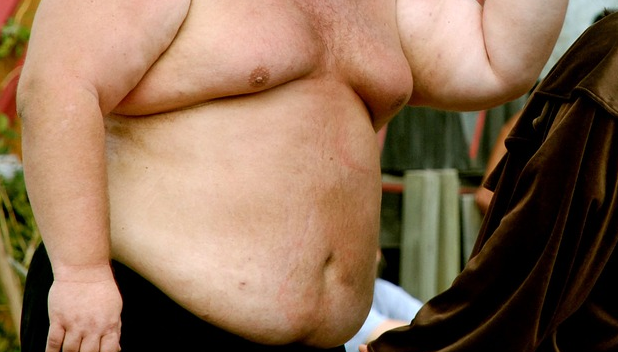Worried about getting fat in college?
With a combination of dining hall fried food, heavy beer consumption, and late-night Taco Bell being the norm, there’s no question that many students will worry about their weight.
That’s obvious, especially with friends who are bad influences and encourage these food binges plus multiple weeks without working out.
But what’s not so obvious is how much you should weigh and how you’re doing on the health spectrum. If you’re not a kinesiology major, you likely have no clue.
Sure, when you put on a tight shirt you might notice a few pounds in places you wish they didn’t show. Or jeans that used to fit are now tough to put on and take off. But this general feeling of weight gain could be in your head.
So because of these changes you notice, you might stand naked in front of a body mirror to take a good hard look at yourself. But the human eye also has its limitations in evaluating body weight.
You recognize this and think you have the perfect solution.
Doing what you haven’t done since high school, you decide to weigh yourself to get a specific number to evaluate. Then you’ll know how you’re doing, you think.
However, the weight you see on the scale leaves more to be desired. Looking at weight alone is actually misleading because it doesn’t account for your height. And since it doesn’t include your height, it can’t accurately relay your health and fitness status.
For example, a person who is 5 foot tall and another who is 6 foot tall are going to have a completely different healthy weight and unhealthy weight.
Because they fail to add height into the mix, the majority of students have no idea what’s a healthy weight for them.
Instead of failing to know what you should weigh based on the eye-test or a scale, there’s a better way to know if you’re underweight, normal weight, overweight, or obese. It’s called your body mass index (BMI).
Check Your BMI Score
Because 200 pounds means skinny for one person and fat for another depending on their height, a better solution is to punch in your height and weight into a body mass index calculator to find your BMI score.
The BMI is a tool to assess your weight status based on your height and weight. This is a much better way to analyze your weight than some random idea in your head or comparing what you weigh now to what you think you weighed in high school.
That’s why everyone should regularly check their BMI score to understand their health and fitness status. It’s not difficult and takes only seconds to get your results.
To see your body mass index score, simply type in your height and weight into this BMI Calculator from the National Heart, Lung, and Blood Institute. After you get your score, compare it to the chart below.
BMI Standards
Underweight = <18.5
Normal weight = 18.5–24.9
Overweight = 25–29.9
Obesity = 30–39.9
Morbidly Obese = 40+
I typed in my height of 6 foot 4 inches and weight of 185 pounds, and my BMI score is 22.5—which is in the normal weight category. I expected I’d be in the normal weight category because I practice discipline each week in going to the gym and eating healthy. Plus my 6’4’’ frame certainly makes it easier for my body to spread out the weight.
Before we discuss your results, I find it interesting to add 10 to 20 pounds to your weight and see how your body mass index score changes. Maybe this extra weight brings you into the overweight or obese category. This exercise is motivating in itself, because 10 to 20 pounds can creep up on you over time.
And being overweight, obese, or morbidly obese is frightening because this causes some of the ailments below:
- High blood pressure
- Stroke
- Heart disease
- Type 2 diabetes
- Cancer
- Osteoarthritis (joint problem of the knees, hips, and lower back)
- Sleep apnea
- Reproductive problems in women
At the worst, we all know that we can lose years off of our lives from being overweight or obese. I’m not trying to scare you. But I do want to communicate that the negative consequences of too much body fat are real.
(To note, BMI is a solid reference point, but it’s not perfect. Genetics play into your weight as well. If you want the most accurate and extensive information regarding your health, set up a consultation with a health professional.)
Take An Honest Look At Your Results
There are two healthy responses to take from your results and they both are possible by only being honest with yourself.
For the people who are content with their BMI and are at normal weight, this is a testament that you’re treating your body well through eating for energy and exercising regularly. Let this good news motivate you to continue what you’re doing because it’s working.
Establishing solid habits as a young adult will lead to a healthy lifestyle that you continue for the rest of your life. And don’t stop with what’s working, because there’s always room for progress.
If you weren’t happy with your BMI category of overweight or obese, don’t get too discouraged. Getting upset about your results doesn’t accomplish any good or help you lose weight. And the good news is that now you know where you stand—the first step in change is awareness. Plus, as a young adult you have plenty of time to improve.
With your awareness that you need change, the next step is to take positive actions so you feel, look, and become healthier. Continue reading to see how you can improve and reverse the cycle of getting fat in college.
How You Can Improve Your Body Weight
Whether the the freshman 15 already happened or you’re worried about the sophomore 30, there are action steps you can take to lose weight and improve your body.
1. The single best way to lose extra pounds is to follow a healthy eating plan. Changing your diet away from fats and sugars to fruits, vegetables, and whole grains will make a big difference. Another helpful tip is to buy smaller plates, or to decide not to eat the entire plate on regular plate sizes. If you study abroad, you’ll notice their portions are much smaller than in the U.S. and it’s a reason they’re skinnier. (For some healthy food ideas, read Easy Healthy Meals For College Students.)
2. Consistently working out will help your body shed unnecessary weight and gain energy for the day. Working out is nice because this will also encourage you to eat healthier so you get more results for all your effort. And when you’re feeling down about yourself or your day, I recommend the first thing you do is to work out to release endorphins.
3. You can also get exercise without going to gym. Do active things you enjoy like playing basketball, playing tennis, swimming, doing yoga, or running. You’ll have a good time and get solid cardio exercise in for the day. For those who struggle making time for the gym, it’s a good idea to start with active activities you enjoy and then transition to lifting weights and doing cardio at the gym.
4. I’m a huge believer in drinking water during the day. Besides all of its other benefits to your body, drinking water will help curb the snacks you eat when you’re bored or think you’re hungry, but you’re actually not. If you want specifics, I recommend drinking half your body weight in water each day, and doing a water drinking challenge to get started.
5. Getting enough sleep is critical if you’re trying to lose weight and become healthier. Because research suggests that people who get too little sleep often weigh more than those who do get enough sleep. This is likely caused by a host of reasons, like being awake longer so you eat more, have less energy to exercise, and sleep deprivation messing up your body’s appetite functions. Look at these sleep tips to get a good night’s rest.
6. When you’re overwhelmed or stressed, a natural response is to find comfort in eating, hence the phrase “comfort food.” Instead, a better solution than eating your day away is to find a healthy escape off campus. Go for a run, hike in a park, or read at a coffee shop. This will help you release stress without adding all the calories and fat in the process.
7. Stop procrastinating on your school assignments if you want to lead a healthier life. It’s impossible to eat healthy, exercise, and get enough rest when you’re up until 6 AM finishing a paper. Ideally you plan ahead and knock your papers out like a champ. But if you’re in a major pinch, consider using an essay writing service to take a burden off your plate.
Final Words
Do you know what country has the highest number of obese and overweight people in the world?
The answer is America and I’m sure you’re not surprised. With our big plates, cheap food, and affordable luxuries, there’s a lot of unhealthy food going in our system mixed with little exercise. That’s how Americans got so fat.
I know many Americans are out of shape, but it’s a shocking statistic that two-thirds of U.S. adults are overweight or obese. Think about that. It’s absurd!
Because of this trend, we certainly know friends and family members who are overweight, and this is dangerous to our psyche.
We can allow our self-talk to say at least I’m not as bad as my friend David. Or we say Suzy gets to eat whatever she wants all the time, it’s not fair. With this self-talk, we lose motivation to make positive changes for ourself.
So don’t go down this path. Instead, recognize they’re different people and this is about you.
That’s why the right mindset is to ignore everyone else around you when it comes to this area. Focus on improving your BMI, make a goal for yourself, and take the actions above in the bullet point list.
If someone is offering you support, like an exercise partner, that’s fine. But many people won’t like the change because it makes them feel bad about themselves. And they won’t be happy that you won’t join them at McDonald’s anymore. Ignore them!
Obviously you don’t want the diseases related to obesity later in life and that’s a reason to become healthier. But don’t underestimate the immediate benefits like having more energy throughout the day and feeling more confident about your body. These can change your life in more ways than you imagine.
Successful students treat their body right to perform at a high level. Join them by getting started today!



